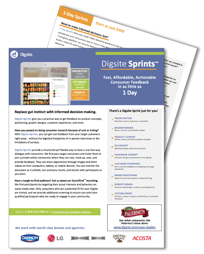.jpg)
Retaining participants in an online community can be challenging, even for the most talented moderator. Online communities, unlike focus groups, do not exactly allow you to clap or use your face-to-face charm to keep people participating. So what’s the secret? One key principle, and seven smart tips, provide the answer.
The key is creating engagement, says Ted Kendall, a “left-handed thinker and doer” at TripleScoop Premium Market Research. In addition to generating quality data, creating engagement with an ongoing community also keeps research costs low.
It also allows moderators to conduct quick, highly-focused research over a long period of time. Less time and money is spent recruiting compared to an ad-hoc project. Keeping participants engaged keeps drop-off rates low, so you won’t have to expend to recruit more people to make up for the loss.
But what are the best ways to keep an online community engaged? For some topics — let’s say, quilting — it is easy to get people talking. Quilters are enthusiastic enough to create online communities of their own. But what about less passionate topics, like tires? Or credit cards? Follow Ted’s tips on how to best engage your online community.
-
Set up an interesting overriding topic. Let’s say you are working for a bank looking to build a product for customers with bad credit scores. Participants are not going to be interested in building the credit card or product itself.
“That wouldn’t be something they would talk to their friends about,” Ted says. The key is to take advantage of areas within that topic that would spark more interest. For instance, maybe focus on financial planning, or on strategies to get out of debt. Be creative.
Sometimes, though, Ted says this strategy is impossible. Don’t be discouraged! There are still a number of ways to get your participants to post and contribute (at least six more of them follow here).
-
Discuss your personal life. It may sound creepy or strange, but revealing personal facts, like your plans to be a witch for Halloween, or a funny story about your dog, will compel others to reciprocate. It builds trust and rapport. However, do not to go overboard. Discussing your bout with toenail fungus, for example, could have the opposite effect.
The more you do this, the better. Yet, as Ted says, “It’s hard to do, because we are used to being an objective, scientific third party. Opening up like that goes against the grain a little. But it works.”

-
Communicate consistently and regularly. Do not overdo it. Hold a discussion once a week, for example, but make sure it is on the same day, around the same time. If you are posting a poll, same thing. When people have routine in the midst of their busy lives, it makes a huge difference.
-
Avoid using research language. Sounds sacrilegious, but talk to your participants as if you were talking to a friend on the phone. Keep this in mind especially when conducting surveys. It should be conversational.
-
Use surveys when you can. People generally like to see where they rank among others when sharing personal insights about a specific topic.
-
See where they stand. Can participants give each other valuable advice? Tips? It is important for you, the moderator, to facilitate such discussions to form a close-knit community.
-
Encourage journaling. Have fun encouraging participants to post pictures and videos. People like to document their lives! And Ted said he finds they also appreciate the variety.
To benefit from the low cost and quality results of maintaining a community, a moderator has to retain participants. Creating engagement is key, and you can easily do so by reframing questions, revealing personal information, and communicating consistently. You’ll be an expert before you know it.
To learn more about how your company can benefit from iterative research, check out our Digsite Sprints Fact Sheet!





